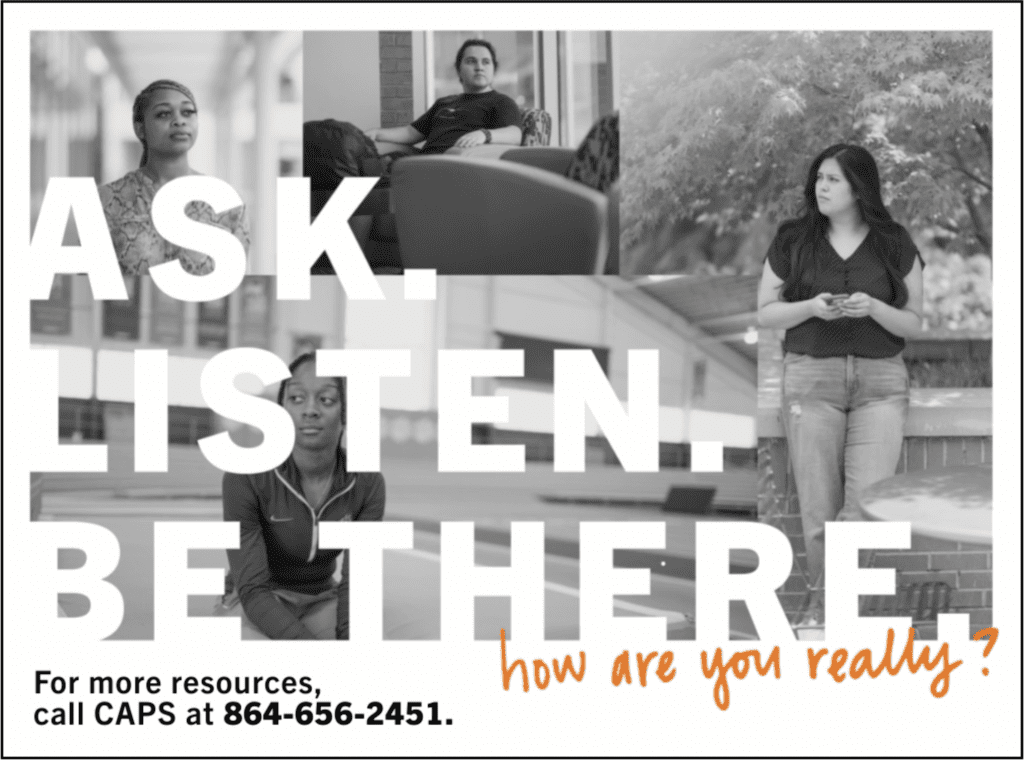The first of September marks the beginning of Suicide Prevention Awareness Month. At Clemson University, we embrace this month as an opportunity to highlight our dedication to Tigers Together, our comprehensive approach to suicide prevention that places our students’ well-being front and center. We believe we share the responsibility of cultivating a safe and nurturing environment for one another. Today, we write on behalf of Tigers Together, urging your active engagement in suicide prevention advocacy and the promotion of mental health resources.
College years are characterized by multiple transitions. Stress is a normal and expected reaction to these transitions. Sometimes stress can be managed with basic self-care skills, like connecting with your peers or engaging in activities. There are other times when the pressure can feel overwhelming, and we need professional help to cope effectively with emotional distress.
Our most recent college health assessment revealed that 28.4% of Clemson students report having been diagnosed with anxiety, and 20.6% diagnosed with depression. Just as physical health varies among individuals, so does mental health. Some may never require therapy, while others find it indispensable. The key lies in recognizing that wherever you fall on this continuum, your mental health is significant and merits attention.
While activities like taking a stroll outside or connecting with fellow students can be profoundly beneficial, there are also numerous on-campus resources available to support your holistic well-being:
- Academic Success Center
- Campus Recreation
- Center for Career and Professional Development
- Clemson Sustainability
- Center for Student Leadership and Engagement

Engaging in campus life is a proactive step for safeguarding your mental well-being. As September unfolds, consider taking an active role in our University’s efforts to prevent suicide:
- Follow @tigerstogether_ on Instagram to stay up to date with our upcoming events for Suicide Prevention Awareness Month.
- Participate in the Mental Health Matters Whiteboard Project on Library Bridge this week. Share why mental health matters to you by jotting down your thoughts on our whiteboard. We’ll share your photo with the Clemson community.
- Join us for the “Pass Encouragement Forward” initiative. Find us near Rhodes Hall this month to pick up a handmade card with an uplifting message and create one for the next person to take with them.
- Participate in a Tigers Together Suicide Prevention Advocacy Training – we have two open trainings this month: Thursday, September 14 at 2 p.m. via Zoom or Wednesday, September 20 at noon in Watt 308. This one-hour training equips you with the knowledge, skills and resources to identify signs of distress, offer immediate assistance and guide others toward professional support. RSVP using our online form. You can also request this program for groups of five or more on our website.
There are actions that you can take to prevent suicide.
Recognize Warning Signs:
These warning signs may mean someone is at risk for suicide. Risk is greater if a behavior is new or has increased, and if it seems related to a painful event, loss or change.
- Talking about feeling hopeless or having no reason to live.
- Talking about feeling trapped or in unbearable pain.
- Talking about wanting to die or to kill oneself.
- Talking about being a burden to others.
- Increasing the use of alcohol or drugs.
- Withdrawing or feeling isolated.
- Looking for a way to kill oneself, such as searching online or buying a gun.
- Having access to self-destructive means.
- Acting anxious or agitated; behaving recklessly.
- Sleeping too little or too much.
- Showing rage or talking about seeking revenge.
- Displaying extreme mood swings.
What to Do:
- Take the warning signs seriously. Do not ignore the signs in hopes they will go away.
- Reach out. Show your concern. Don’t worry about saying the wrong thing. Your genuine concern is what is important.
- Ask if the person is thinking about suicide. Be direct. Be persistent and sensitive to solicit an answer.
- Convey hope to the person who is struggling. Hope is the best defense against suicide.
- Listen and accept the person’s feelings calmly and without judgment.
- Do not act shocked or argue with the person.
- Don’t be sworn to secrecy.
- Know the resources at Clemson University and in our community.

Available Resources:
- National Suicide and Crisis Lifeline: If you or someone you know is in immediate crisis, call or text 988 for 24/7 confidential support.
- Counseling and Psychological Services (CAPS): Clemson’s CAPS offers counseling services to students who may be struggling with mental health concerns. Reach out to CAPS for a safe and supportive environment to discuss your challenges. You can call 864-656-2451 to set up an appointment during business hours, or press 2 from the option menu to be connected with a counselor after hours.
- CARE Network Report: If you are concerned about a fellow student’s well-being but aren’t sure how to help, consider submitting a CARE report. While this is not for emergencies, this report will initiate the University’s support network to reach out to the individual in question and connect them to resources.
- Tigers Together Suicide Prevention Website: Our Tigers Together website includes these resources and other helpful information related to mental health and suicide prevention.
Tigers Together is not just a slogan but a testament to our commitment to the mental health and well-being of every student at Clemson University. By understanding the continuum of mental health, utilizing on-campus resources, participating in awareness events and recognizing warning signs, we can create a supportive and caring community that stands united against suicide. Together, we can make a difference in the lives of our fellow Tigers.
Be well and go Tigers!
Delana Reynolds
Assistant Director for Suicide Prevention and Mental Health Initiatives
Healthy Campus
Jennifer Goree
Director
Healthy Campus

